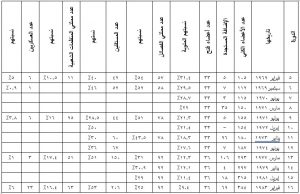Lecture by the Palestinian National Council
Within the series of introducing the Palestine Liberation Organization by Dr. Issam Adwan
*Palestinian National Council:
is the supreme authority of the PLO, which sets its policies, plans and programmes, It is a Palestinian parliament that includes representatives of Palestinian guerrilla factions, popular unions, representatives of the Palestine Liberation Army and independent figures with competence and competence. The fourth session of the National Assembly was in July 1968, It is the first session in which the Palestinian guerrilla factions participate on frontal grounds, The following courses were then incorporated as such with some change, In the proportions of representation of these factions versus the proportions of representation of both popular unions and independents.

The number of members of the Council has been steadily increasing, While the number of members of the Council representing the factions is officially established, The factions, especially Fatah, compensated for their need to have a majority of votes in the Council, the introduction of independents in relatively large and ever-increasing numbers, With the increase in the shares of popular organizations, such as the Union of Students, Workers, Women, Writers, Teachers and the Red Crescent.
There was a continuous need to increase the number of members of the National Council in order to cover the widest possible sectors and areas of the Palestinian people. In the face of the need for this increase, Fatah has worked hard to maintain its control over the Council through Fatah affiliates or supporters. or compatible with it among independents and popular organizations, which won a decision at the tenth session of the National Assembly to allocate 50% of the new members of the Council to popular organizations, which conducts its internal elections for the selection of the General Secretariat of the Union.
Hence its representatives are called within the National Assembly. Fatah has acquired the majority of the seats in the General Secretariat of each of the popular unions. Of the 17 members of the National Assembly at its ninth session in 1979 representing the People’s Unions, There were at least 13 Fatah members among them. Of the 22 representatives of the unions at the eleventh session of the Council in 1973, 15 were members from Fatah. Of the 55 representatives of the unions at the sixteenth session of the Council in 1983, at least 33 were members from Fatah. The remaining number of representatives of the federations are divided among various factions and affiliations, and they do not constitute a coherent force.
Continue in the lecture of the “Palestinian National Council”
As for the independent members of the National Assembly, Early on, They were named by popular committees, Then with the participation and approval of the Executive Committee, Together with the Presidency of the National Assembly, Then a membership committee consisted of the presidency of the Council, the Executive Committee, representatives of the factions and some independents. The names shall then be submitted to the Council for public suffrage. At the end of the term of each House, a preparatory committee from the Office of the Speaker of the Council and the Executive Committee shall be assigned to form a new National Assembly. It takes into account the frontal relations of the factions and forces of the Palestinian people and their independent personalities.
Thus, the names of the members of the Council are determined as a result of long deliberations between the faction leaders of the Organization before each session, As a result, the members of the Council have maintained their membership for often successive sessions. Within the framework of agreements, balances and interests that have nothing to do with the foundations of the democratic process or the real representation of the Palestinian people, The matter applies to the selection of independents, who have been the sole Chairman of the Executive Committee since 1973, to approve their selection after formal consultation with the Presidency of the Council and the representatives of the factions, Other factions accept the nomination of a few close independents and supporters. to agree to the rest of the names, Which often concerns opening.
Some questioned why there had been no election among Palestinians where possible. With the rise of the tide of the revolution in late 1968 and during 1969, it was possible to hold elections in most countries of the world that harbor significant Palestinian communities. The most important of which are Jordan and then Lebanon, This is evidenced by the holding of elections for various Palestinian trade unions and popular federations in various gatherings.
The quota system in force in PLO bodies was better for Fatah’s dominance and control over Palestinian decision-making. It has also given other organizations a representation that in many cases exceeds their actual size and weight in the Palestinian arena. The examination of each organization is preserved, and do not decrease, They increase over time.
Continue in the lecture of the “Palestinian National Council”
With regard to the decisions of the National Assembly, Fatah’s Central Committee and the Revolutionary Council usually meet to discuss the agenda of the PNC before it convenes. Therefore, Fatah will not be surprised inside the Council with anything, Being open, Through consultations of its bloc within the Council (composed of Fatah elements and those close to it), and those approving its policy, of independents and grassroots unions, and occupied territory, and some supporters of its policy within other factions), has identified the chances of success of the resolution you intend to submit to the Council, If you see an opportunity for its success, I showed it to him.
Hence, the Fourth General Conference of Fatah decided in May 1980 “to consider the decisions in force of the Palestinian National Councils of the Palestine Liberation Organization as an integral part of the political program of the movement in a manner that does not conflict with the principles and objectives of our movement and our political programs, in line with the leadership position of our movement in the PLO.” The Central Committee confirmed the decision in early 1984. It decided that “the political position of Fatah is the political position of the Palestinian National Council.” The interpretation of the decision adopted by the Fourth Congress was that “Fatah is the author of these decisions”.
Source: Dr. Essam Adwan, Palestinian National Liberation Movement (Fatah) 1969-1983, p. 276







